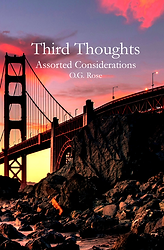
Social Analysis
Ontoepistemology
Life Philosophy
Creative Writing
Music Education
Newest Release
Life Philosophy
Third Thoughts is a collection of fifty considerations by O.G. Rose. Readers can enjoy the works in conjunction with each other or treat the collection like a box of chocolates, for each work is a completed insight. Third Thoughts reveal how our ideas are like eyes, giving perspective on everything in life. Titles include:
The Socratic Embodiment
Truths, Falsities, and Blurs
A Valuable Life
History Is Actually Possible
Probable Cause
Dialectical Ethics
The Elder Spirit Moves
Phenomenological Pragmaticism
Do Not Ask “Has it Been Said?” but “Has It Been Heard?”
The Story of the Japanese Renaissance
“The Such/Lack Solution” to the “Is/Ought Problem”
And many more.
If you are in Europe and Amazon will not let you purchase paper copies of any of our books, try Amazon.de (Germany).
Collaborations

O.G. Rose is the pen name of Michelle and Daniel. The name’s origins come from the maiden and middle names of Michelle, along with the couple’s shared last name. While at the University of Virginia, O.G. Rose spent several years working collaboratively with other artists at Eunoia, a creative community O.G. Rose helped develop in Charlottesville, Virginia. O.G. Rose now lives on a farm with their children, manages a wedding venue named Mead Lake Lodge, teaches piano using a visual pattern method called the DLGPM, and writes nonfiction and fiction.
A finalist for the 2020 UNO Press Lab Prize and 46th Pushcart Nominee, O.G. Rose’s creative works appear at The Write Launch, Allegory Ridge, Streetlight Magazine, Ponder Review, Iowa Review online, The William and Mary Review, Assure Press, Toho Journal online, West Trade Review, ellipsis, Poydras Review, O:JA&L, Burningword, and Broken Pencil. Their published books include The Conflict of Mind (2021), A Philosophy of Glimpses (2022), Thoughts (2022), Belonging Again: Part I (2023), Second Thoughts (2023), Belonging Again: Part II.1 (2024), Under the Wing (2024), and The Map Is Indestructible (2025).
Contact Us:
History and Other Involvements



.jpg)
.jpg)

.jpg)
.png)


.png)




.jpg)

